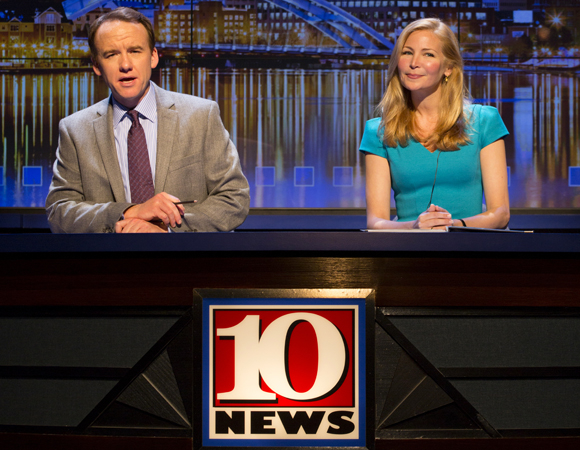The Power of Duff
Stephen Belber’s fantasy about a newscaster who appends a prayer to his signature sign-off lacks bite – and credibility.

(© T Charles Erickson)
The Power of Duff, the Stephen Belber play currently running at the Huntington Theatre Company after a production at the Powerhouse Theater last year, takes one very thin premise and stretches it to lengths as absurd as silly string.
His protagonist, the titular Charles Duff (David Wilson Barnes), is a once-ambitious newscaster cooling his heels in a third-tier city (Rochester, New York), where the headline of the day is likely to center on cow casualties from a farm fire — a facile jape that bears little resemblance to reality, however rural the market (which Rochester is not).
One evening, fresh off his father’s funeral, Duff is moved to “send out a prayer to everyone who’s lost someone recently.” This breach of protocol sets his station manager, Scott Zoellner (Ben Cole), to sputtering, but also sets the phone banks and Twitterverse ablaze.
An unlikely story? Not if you consider a factoid: Belber drew inspiration from a 2005 Time magazine report suggesting that 95 percent of the U.S. population professes faith in a higher power. Duff’s pious sign-offs, embraced by deists of all stripes, soon become a cause célèbre — especially after one of his prayers appears to get results. Zoellner can fulminate all he likes: Duff, with God apparently on his side, is on a roll.
Among Duff’s coups is a campaign to raise funds for an AIDS patient, Joseph Andango (Russell G. Jones), an African immigrant who has lost his job, and with it his health coverage. (The play, originally a screenplay, was written well before the Affordable Care Act.) If you can buy the notion that the religiously inclined — a sector sometimes lacking in empathy when it comes to this particular affliction — would rush to Andango’s aid, Belber has another heart-wrencher in store. He tips his hand, clumsily, by having Duff’s bitter, estranged ex-wife (the excellent Amy Pietz, familiar from countless TV shows) announce her determination “to practice positive thinking so as to ward off a recurrence of breast cancer.”
One terminal illness? Sure. Two is overkill, and symptomatic of Belber’s intent to milk his “what ifs” for every last melodramatic drop.
The real tragedy of this production is that Barnes, so deliciously caustic in Gina Gionfriddo’s Becky Shaw a few years back, is straitjacketed by a bland and affectless role. If you’re among the camp convinced that religious bias has no more place in the news than it does in politics, you may find yourself rooting for those who bridle at Duff’s namby-pamby pablum: Zoellner, initially (Cole delivers some magnificent harangues before caving in to the ratings), and especially Rick, Duff’s furiously alienated son (Noah Galvin, giving good glower).
Jennifer Westfeldt’s radiant intelligence is wasted in the nowhere role of Duff’s conventionally attractive coanchor, whose secret vulnerability — her cross to bear — is an autistic child. Brendan Griffin, playing John Ebbs, the news team’s hearty-bro sportscaster, does his best to inject some energy into the proceedings. Like clockwork, one character after another is driven to confess his or her innermost misgivings (call them sins), once Duff has established his saintly bona fides.
As Duff modestly pontificates or merely absorbs others’ pain, Barnes is required to embody what young Rick decries as the simulacrum of “some haunted, reluctant saint.” As such, Duff — character and play alike — can be a real drag.









